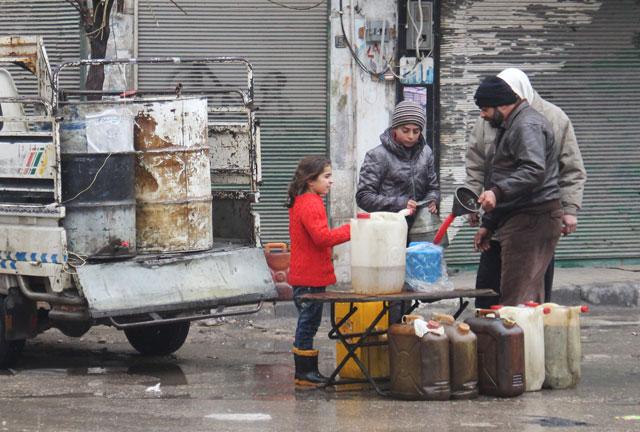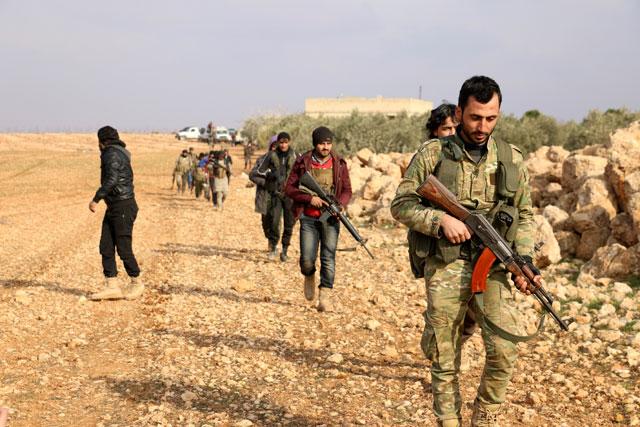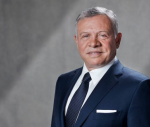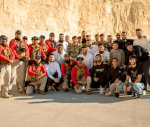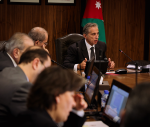You are here
Fighting puts Syria peace negotiations at risk
By AFP - Jan 03,2017 - Last updated at Jan 03,2017
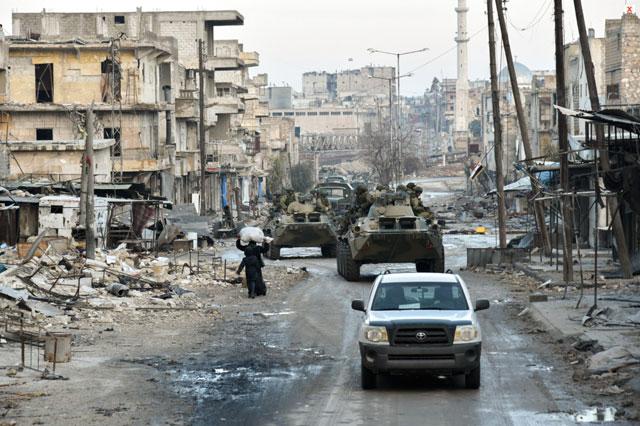
This undated handout photo released by the Russian defence ministry reportedly shows Russian military engineers driving in their APCs to operate in Aleppo, Syria (AP photo)
BEIRUT — A dozen Syrian rebel factions have suspended talks on new peace negotiations, accusing President Bashar Al Assad's regime of violating a four-day-old ceasefire with attacks near Damascus that continued Tuesday.
The decision threatens the process sponsored by regime ally Russia and rebel backer Turkey, which began with a truce and is meant to lead to negotiations in the Kazakh capital Astana this month.
The ceasefire has brought quiet to large parts of the country but has been undermined by sporadic violence, particularly fighting in the Wadi Barada region north of Damascus that supplies the capital's water.
Government forces backed by fighters from Lebanese Shiite movement Hizbollah continue to press a two-week offensive there despite the ceasefire, which began on December 30.
A dozen rebel groups announced late Monday the “freezing of all discussion linked to the Astana negotiations”.
They said they had respected the ceasefire, but accused the regime of “major and frequent violations, notably in the [rebel] regions of Wadi Barada and Eastern Ghouta”, near Damascus.
“If things don’t return to how they were before, the accord will be considered null and void,” they said.
It was signed by a dozen groups, including the Army of Islam, Faylaq Al Sham, and the Sultan Murad Brigade, which is close to Turkey.
‘Critical phase’
Fierce fighting in Wadi Barada continued on Tuesday, the Britain-based Syrian Observatory for Human Rights monitor said.
Government forces used barrel bombs and artillery after advancing on Monday to the outskirts of the Ain Al Fijeh spring, the area’s main water source, it said.
The regime accuses rebels of deliberately damaging infrastructure there, poisoning the water supply with fuel then cutting the flow to Damascus altogether.
Rebels say government strikes caused the damage, which has left four million people in Damascus without water since December 22.
The regime says former Al Qaeda affiliate Fateh Al Sham Front is in the area, a claim opposition fighters deny.
Fateh Al Sham, along with Daesh, is excluded from the truce.
Syrian state media has been conspicuously quiet on the Wadi Barada battle, but Damascus governor Alaa Ibrahim told the Al Watan daily that the army was progressing.
“Military operations are under way, and God willing there will be happy news soon,” he told the newspaper, which is close to the government.
Observatory Director Rami Abdel Rahman warned the truce was in a “critical phase” and faced “collapse” if sponsors Russia and Turkey did not intervene to save it.
The monitor reported violations elsewhere in the country on Tuesday, including air strikes on the town of Khan Sheikhun in the northwestern province of Idlib that killed a pregnant woman and wounded three other civilians.
Russia’s defence ministry said Tuesday it had noted 27 ceasefire violations around Damascus and in Hama, Aleppo and Latakia provinces over the previous 24 hours, but did not say who was responsible.
It added that the Turkish side of a joint monitoring mission had recorded 18 violations.
The observatory said air strikes targeted a Fateh Al Sham base where senior members of the group were meeting near Sarmada in Idlib province.
It was not clear whether the strike was carried out by the regime, Russia or an US-led coalition jet, Abdel Rahman said. He did not say how many casualties it caused.
An AFP correspondent saw several strikes hitting the town including one on a Fateh Al Sham checkpoint.
Spillover in Turkey
The ceasefire and planned talks are the latest effort to negotiate an end to Syria’s conflict, which has killed more than 310,000 people since it began with anti-government protests in March 2011.
Despite backing opposite sides in the conflict, Ankara and Moscow have worked closely of late, brokering a deal allowing civilians and rebels to leave Aleppo city before government troops seized it last month.
Russian-Turkish efforts have been backed by the UN Security Council, despite offering a competing track to UN-sponsored talks set to resume in Geneva in February.
Russia and Turkey, which are organising the talks in Astana along with regime ally Iran, say they are meant to supplement the UN-backed process, not replace it.
Both Russia and Turkey have launched military interventions in Syria. Moscow entered on the government’s side in September 2015, while Ankara began an offensive against Daesh and Kurdish militants in August 2016.
The conflict has spilled into Turkey, with a string of deadly attacks claimed by or blamed on Daesj or Kurdish groups.
On Monday, Daesh claimed responsibility for a New Year’s attack on an Istanbul nightclub that killed 39 people.
Turkey’s Hurriyet daily reported Tuesday that the attacker had fought for Daesh in Syria.
Related Articles
BEIRUT — Syria's army advanced on Monday as it battles to capture a rebel region that is key to the capital's water supply, launching strike
BEIRUT — Key rebel group Ahrar Al Sham said on Wednesday it will not take part in peace talks in the Kazakh capital next week aimed at endin
BEIRUT — The United Nations warned on Thursday that sabotaging water supplies was a war crime after the main source for Syria’s capital was


